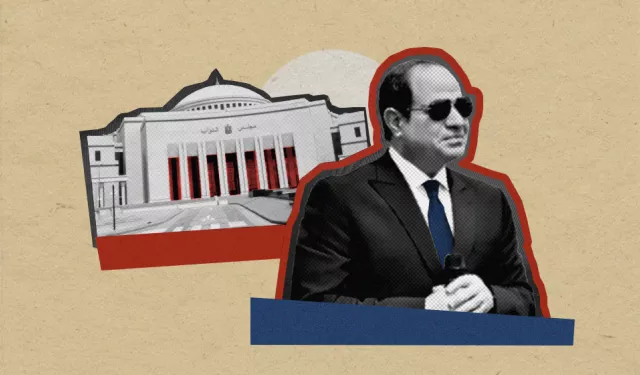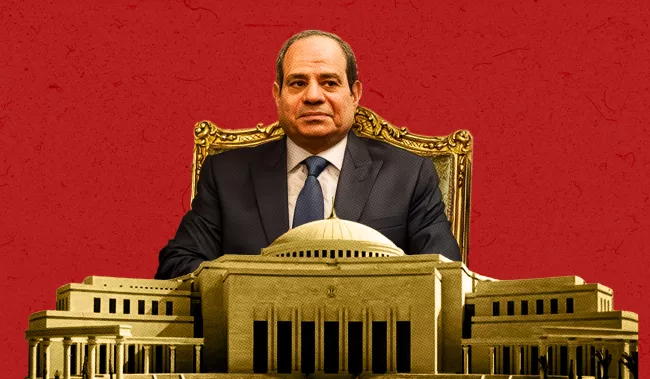
2025 elections: What next after the president’s seismic intervention?
Since preparations began for the 2025 parliamentary elections, with the engineering of candidate lists and slates, it was clear it would not pass calmly.
Despite the violations that marred the first phase and comparing it to the 2010 elections that paved the way for the January 2011 revolution, no one expected the president to intervene, or the National Elections Authority head Hazem Badawy’s to announce voiding the results in 19 constituencies out of the 70 that made up the first phase.
An election portrait
The first day began with the withdrawal of Nashwa Eldeeb, the independent candidate in the Giza district of Imbaba, which she has represented in the House of Representatives for ten years.
Minutes after polls opened, Nashwa announced her withdrawal in one of Imbaba's streets while addressing a crowd of supporters. She described the elections as neither fair nor based on the principles of transparency and equal opportunity.
In an interview after her withdrawal, she revealed that she had been reaching out to several institutions and officials, appealing to them to stop the bias being shown in favor of a particular candidate, and to let voters decide. But the signals from the first few minutes of voting, and what preceded them, were enough for the former MP, who supports President Abdel Fattah El-Sisi, to decide to pull out.
Over two days, the operations rooms of "opposition" parties documented a number of violations, whether around polling stations in the form of voter steering and vote-buying, or during the count, where candidate agents were barred from attending and were not given official copies of vote tallies from polling stations.
These scenes culminated in videos on social media and chants of “It’s rigged! It’s rigged!” and “One, two, where did our votes go?” revealing anger at the preliminary vote counts in several governorates, especially in Upper Egypt. Demonstrations broke out in a number of areas against the results announced by the counting centers in some constituencies.
The Interior Ministry announced the arrest of several people it described as instigators, and said that some of the video clips documenting violations had been generated with artificial intelligence.
Despite the clear engineering of these elections and the precise calculations behind them, pro-government parties did not emerge from the first round of the first phase with everything in the bag.
The National Front Party lost the two seats in the Armant and Esna districts in Luxor Governorate, while the count in some Sohag districts showed that the Homeland Defenders Party had lost four seats, upending the pro-government alliance’s calculations.
In this context, a source from the campaign of one National Front candidate predicted that Nation’s Future would not abide by the joint agreement between the pro-government parties and was quietly working in favor of some independents close to Nation’s Future.
The president’s earthquake
President El-Sisi’s intervention one day before the result announcement caught all sides off guard.
He called on the NEA to exercise utmost rigor in examining these incidents and the appeals filed over them, to make decisions that “please God” and faithfully reflect the true will of voters, and to put transparency first by ensuring that each candidate’s representative receives a copy of the polling station’s vote tally, so that members of the House of Representatives truly represent the Egyptian people in Parliament.
El-Sisi urged the NEA not to hesitate to take the right decision when it is impossible to ascertain the real will of the voters, whether by canceling this election phase in full or partially.
The next day, the NEA declared the elections in 19 constituencies null and void. These were seismic decisions for these engineered elections and for the future of those who designed them, even if they appeared to welcome them and raced to praise the president’s wisdom and the authority’s integrity.
In the wake of the earthquake, it has become harder to obtain documented information about the real reasons behind it. This is not the first time elections have seen violations that begin with restrictions on candidacy and end at the counting stage.
The Court of Cassation is still considering appeals against the 2020 House of Representatives elections, with no rulings issued yet. And the August elections for the Senate saw violations and abuses that did not lead to changing or voiding the results.
Despite the paucity of hard information, especially in this sensitive area linked directly to the presidency and the heads of the main security agencies, what is being whispered in political and parliamentary backrooms is that one security body submitted a report to the president on the elections, warning of irregularities and popular anger that could revive memories of the 2010 elections.
This, it is said, prompted presidential intervention aimed at absorbing the anger, drawing a line under some blatant interference, and at the same time securing popular support for him.
A look at the canceled districts
Imbaba is the only district to have had its elections voided in Giza Governorate, although the numbers released by the counting center had indicated a runoff between four candidates: Walid El-Meligy of Nation’s Future, Ihab El-Khouly of the Conservative Party, and the independent candidates Ahmed El-Agooz and Ahmed Abdel Kader.
Nashwa Eldeeb, who chose to withdraw on day one, received around 13,000 votes. Meanwhile, the district’s former MP and current candidate Shadia Thabet appeared in a video appealing to El-Sisi: “Where did my votes go?”
In Alexandria’s second district, based in Al-Raml, the NEA decided to cancel the results, even though the preliminary tallies indicated a runoff for the district’s three seats among six candidates, including the pro-government alliance’s candidates from Nation’s Future and Homeland Defenders.
By contrast, the authority voided the results in all districts of Qena Governorate, where candidates from the pro-government alliance, along with a number of independents and some opposition candidates from the Justice Party, the Conservative Party and the Wafd Party, were competing.
In Sohag Governorate, seven districts were canceled, including the Al-Maragha district, which has a single seat. The pro-government alliance nominated Omdah Hashem of the Homeland Defenders Party for that seat, competing with 10 independents, among them Refaat Shakib, the sitting member of parliament from the Nation’s Future Party who chose to run as an independent after the party dropped him from its slate. At the end of the second day of voting, Shakib announced he was withdrawing, saying he could not compete with political money.
The six other Sohag districts saw competition between the alliance’s parties—Nation’s Future, National Front, and Homeland Defenders—on one side, and a number of independents and some Justice Party candidates on the other.
The NEA also annulled the elections in several districts in Beheira Governorate, including Damanhour, where the counting center’s preliminary tallies had shown Sanaa Barghash of the Nation’s Future Party winning the highest number of votes.
Where are we heading?
Anyone who expects progress toward fully free and fair elections, and pins high hopes on the second phase, which includes Cairo and the eastern and central Delta, is likely to be disappointed.
The flawed laws governing elections are still in place, from the electoral system that allows fine-tuned planning and engineering of a parliament aligned with the government, to the large districts that boost the chances of the wealthy and business people.
At its press conference, the NEA did not announce any rules that would prevent repeating the violations, especially vote-buying, mobilizing citizens to vote for specific candidates, and directing voters outside polling stations. It did not disclose penalties for documented violations or accountability mechanisms perpetrators.
Yet, there may be some cosmetic improvement in the second phase, such as better organization of the voting process and greater care by vote-buyers to keep the action away from polling stations and to avoid being caught on cameras. Candidate representatives will likely be allowed to attend the count and receive tally sheets from polling stations.
The scope for interference in favor of specific candidates may become less blatant, especially after the presidential intervention, which could give these elections a limited new lease of life and encourage some of those who had opted out to go to the polls and vote.


